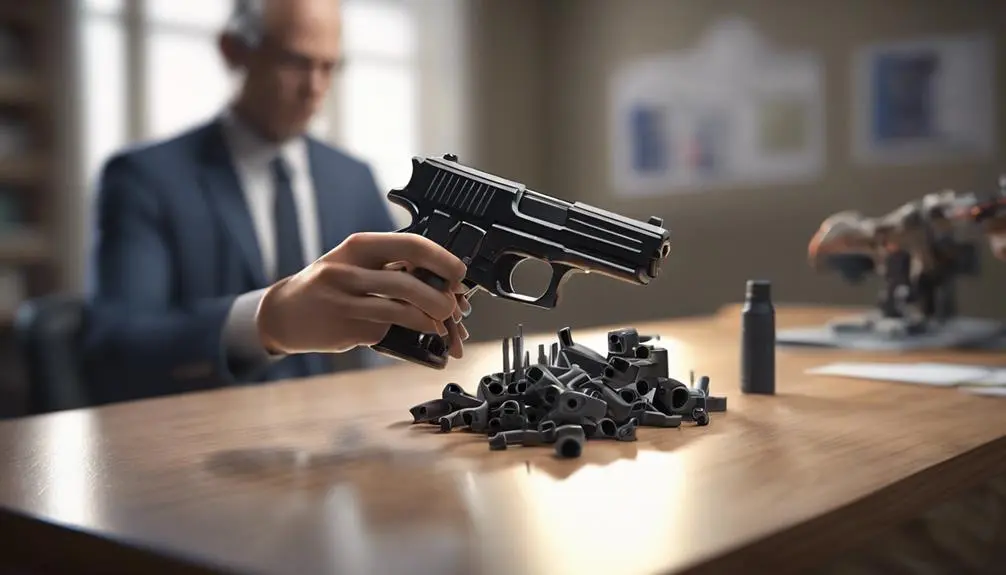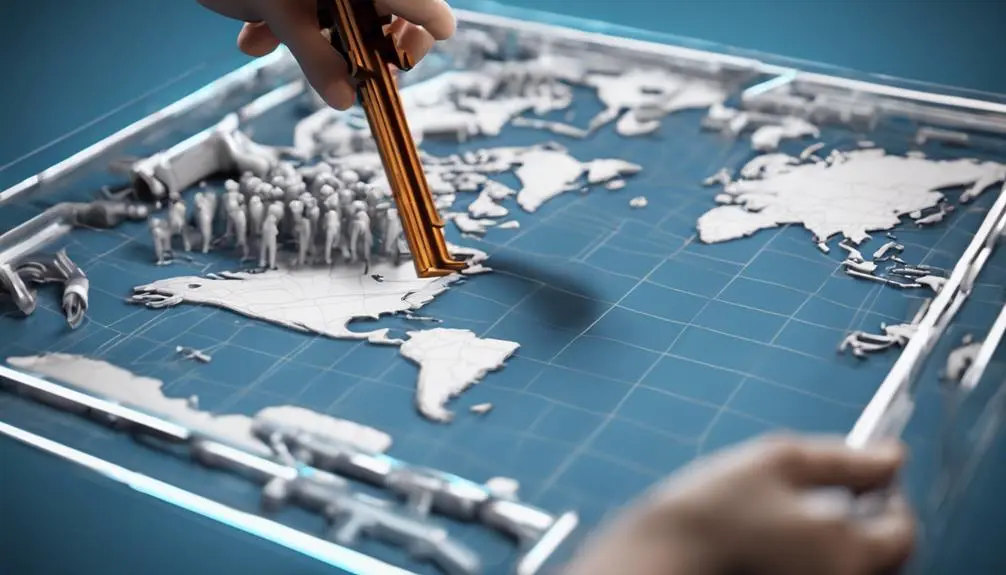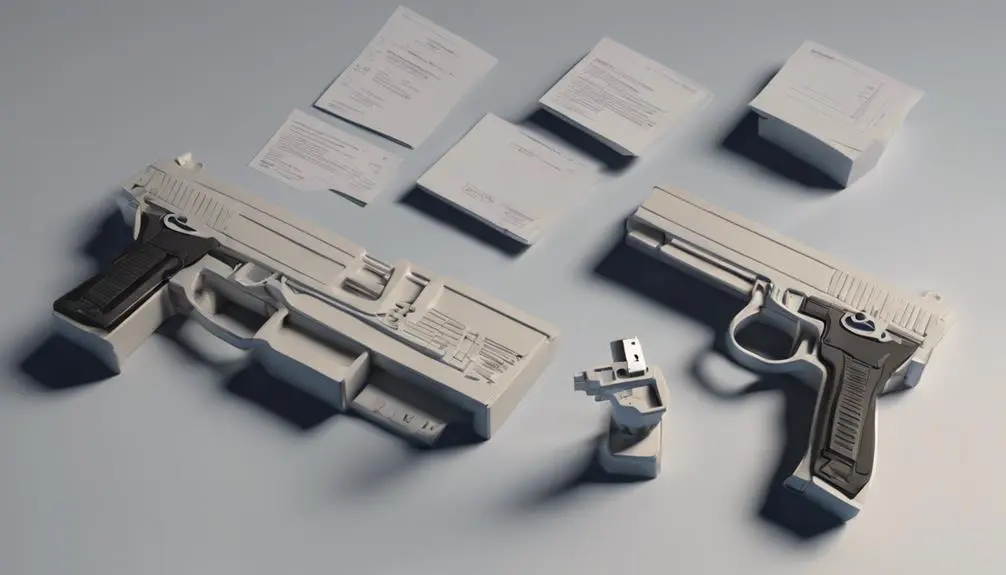Downloading 3D printed gun files is not inherently illegal. The legality hinges on federal regulations and adherence to firearm licensing rules. While there's no blanket federal ban, be mindful of state laws governing gun downloads. States like New York and California have strict regulations to limit access and prevent distribution. Public safety and national security concerns arise due to untraceable firearms. Stay informed on evolving laws and seek legal resources for a thorough understanding. Further exploration into the intricacies of 3D gun regulations can provide a in-depth understanding of the complexities involved.
Legal Considerations on 3D Gun Downloads
When considering the legal aspects of downloading 3D gun files, it's vital to understand the complexities surrounding this practice.
While downloading 3D printed gun files isn't inherently illegal at the federal level, the legality varies due to differing state regulations. For instance, Defense Distributed, led by Cody Wilson, permits U.S. residents to access and download gun blueprint files, but challenges have arisen due to past restrictions by the State Department on online blueprint distribution.
It's noteworthy that even though downloading these files may not breach federal laws, producing firearms from them without the proper licenses or serial numbers violates regulations.
The legality of downloading 3D printed gun files is subject to ongoing legal battles, which highlight the need to navigate the intricate landscape of state regulations to comply with the law.
It's crucial to stay informed about the evolving legal framework surrounding 3D printed gun files to avoid any potential legal pitfalls.
Federal Regulations and 3D Gun Files
Amid the ongoing legal battles and regulatory shifts, understanding the federal regulations concerning 3D gun files is vital for maneuvering through this complex landscape.
At the federal level, there's currently no specific ban on sharing blueprint files for 3D printed guns. This means that individuals can legally download these files without violating federal regulations. Defense Distributed, under the leadership of Cody Wilson, has previously permitted U.S. residents to access and download 3D gun files.
It's important to note that the State Department had previously imposed restrictions on the online distribution of gun blueprint files, sparking legal challenges. The Trump administration sought to transfer the oversight of 3D gun files from the State Department to the Commerce Department.
As a result, ongoing lawsuits between states and gun advocacy groups continue to unfold regarding the sharing and production of 3D-printed gun blueprints. Stay informed about these federal regulations as they may impact the legality of downloading 3D gun files in the future.
State Laws Impacting Gun Downloads
State laws play a significant role in regulating the downloading of 3D-printed gun files, impacting individuals' ability to access and possess these digital blueprints. Several states have implemented laws to control the distribution and possession of such files, aiming to prevent the creation of untraceable firearms. Here's a breakdown of how some states approach the issue:
| State | Laws on 3D Gun Files | Impact on Possession |
|---|---|---|
| New York | Blocks release and distribution | Prohibits access |
| Pennsylvania | Takes legal actions to prevent sharing | Limits availability |
| California | Regulates possession of digital blueprints | Restricts creation |
| Texas | Allows limited access for personal use | Controls usage |
| Illinois | Prohibits possession of untraceable weapons | Bans ownership |
These state laws reflect the ongoing legal battles and concerns surrounding the proliferation of untraceable firearms through the downloading of 3D-printed gun files.
Public Safety Concerns With 3D Guns
Public safety concerns arise from the accessibility of 3D-printed guns due to their potential for being untraceable and undetectable firearms. The ease of obtaining 3D gun files online has raised alarms within law enforcement agencies, sparking debates about the risks associated with homemade weapons.
The distribution of these files online has highlighted the need for regulatory oversight to address the misuse of 3D printed gun blueprints. The implications for public safety are significant, as the unregulated access to these files can lead to the production of firearms without serial numbers or metal components, making them harder to trace and detect.
The ongoing discussions about the dangers posed by 3D printed guns underscore the necessity for stringent enforcement measures and clear guidelines to mitigate the risks associated with their proliferation. Considering these concerns, the debate on regulatory oversight continues to evolve, with some states already implementing restrictions to bolster public safety.
National Security Implications

With the ongoing legal battles and regulatory shifts surrounding the distribution of 3D gun blueprints, the national security implications have become a focal point of concern.
The online availability of 3D printed gun files raises serious issues related to national security. The ease of access to these files allows individuals to manufacture untraceable firearms, circumventing traditional regulatory measures. This poses a significant challenge for law enforcement agencies in tracking and monitoring the production and distribution of such weapons.
Moreover, the potential misuse of 3D printed gun files by malicious actors, including terrorists or individuals prohibited from owning firearms, adds another layer of complexity to the national security landscape. The anonymity and decentralized nature of online distribution make it difficult to prevent unauthorized individuals from acquiring these files and creating unregistered firearms, which could potentially be used to commit crimes or threaten public safety.
In light of these concerns, policymakers and security experts are grappling with the implications of unregulated access to 3D printed gun files and the broader impact it may have on national security efforts.
Opposition to Gun Regulations
You may encounter strong resistance against implementing stricter gun regulations regarding downloading 3D printed gun files. Opposition to regulations surrounding 3D printed gun files stems from concerns over the unregulated production of firearms, which can bypass traditional gun control measures. Here is a breakdown of key arguments against imposing stricter regulations on 3D printed gun files:
| Opposition Point | Explanation | Impact |
|---|---|---|
| Defense of 1st Amendment Rights | Some argue that restricting access to 3D gun files infringes on free speech rights. | Raises questions about the balance between security and freedoms. |
| Technological Inevitability | With advancing technology, blocking access to 3D gun files may prove futile. | Highlights challenges in regulating digital blueprints. |
| DIY Culture Empowerment | DIY enthusiasts view making firearms as an extension of personal freedom. | Challenges traditional views on gun manufacturing and ownership. |
Global 3D Gun Laws Overview

In different countries, regulations on 3D-printed firearms differ greatly, reflecting diverse approaches to controlling the production and possession of these weapons.
The global landscape regarding 3D-printed firearms laws is varied. For instance, the UK strictly prohibits the production of such firearms without government approval.
In Germany, laws are in place that ban the unlicensed manufacture of firearms, irrespective of the method used, including 3D printing.
Likewise, in Canada, a business license is required to produce firearms, making it illegal to 3D print guns without one.
On the other hand, Singapore has strict regulations where it's illegal to possess or print 3D firearms, with even possessing digital blueprints without a license being against the law.
These examples highlight the global nature of 3D-printed firearms laws and the varying degrees of control that different countries exercise over their production and possession.
Specific State Regulations in the U.S
State regulations in the U.S regarding downloading 3D printed gun files vary widely, impacting the legality and requirements for possessing such firearms.
For example, New Jersey has strict laws against firearms mainly made from plastic, potentially making it illegal to download 3D printed gun files in the state.
In contrast, California mandates that all firearms, including those produced from downloaded 3D printed gun files, must have unique serial numbers.
Massachusetts prohibits undetectable firearms, a category that can include weapons created from downloaded 3D printed gun files.
States like Rhode Island necessitate serial numbers and background checks for gun parts, which could affect the compliance with the law of 3D printed gun files.
Additionally, specific laws in states such as Washington, Colorado, and Oregon target untraceable firearms, potentially encompassing guns made from downloaded 3D printed gun files. It's important to be aware of these diverse state regulations to adhere to the law when dealing with 3D printed gun files.
Understanding 3D Gun Laws

Understanding the regulations surrounding 3D printed gun files is vital in navigating the legal landscape of firearms possession and distribution. In terms of federal law, the legality of downloading such files can be a complex issue. While it isn't inherently illegal to possess or distribute 3D gun blueprints, there are certain considerations to keep in mind.
The term 'ghost guns' refers to firearms that are homemade or privately assembled without serial numbers, often using 3D printed parts. These ghost guns can raise concerns regarding untraceable firearms and may be subject to specific regulations.
Moreover, the online distribution of 3D gun files has been a point of contention. Defense Distributed's decision to allow U.S. residents to download these plans has led to legal battles and discussions about the intersection of free speech, gun rights, and public safety. It's important to stay informed about the evolving laws and regulations surrounding 3D printed guns to comply with both federal and state mandates.
Available Legal Resources
Understanding the legal landscape surrounding 3D printed gun files requires awareness of available legal resources for individuals seeking guidance on compliance and regulations.
In terms of federal law, downloading 3D printed gun files isn't explicitly illegal. However, the online distribution of gun designs has been a point of contention. Recently, there have been efforts to regulate the distribution of 3D printed gun files in order to prevent them from falling into the wrong hands. Some argue that this infringes on the freedom of speech and the right to bear arms, while others believe it is necessary for public safety. Despite the debate, the ease of access to 3D printing technology and top 3d modeling software has raised concerns about the potential for these designs to be used for illegal purposes.
To navigate this complex terrain, individuals can turn to resources such as legal aid organizations specializing in firearms law, online repositories of legal information, and government websites outlining regulations on 3D printed firearms.
These resources can provide clarity on the current legal status of downloading gun files, offer insights into any recent legislative changes, and guide individuals on how to stay compliant with federal regulations.
Frequently Asked Questions
Are 3D Gun Files Illegal?
Downloading 3D gun files raises legal implications, ethical concerns, and public safety considerations. It's important to assess the impact of sharing such files on society and regulation. Stay informed and engage in responsible practices.
Can 3D Printed Guns Be Detected?
Detecting undetectable guns poses challenges for law enforcement. Metal parts in 3D-printed firearms may aid detection. Legal implications arise due to these guns evading security measures, raising concerns about public safety and national security.
Can You Serialize a 3D Printed Gun?
You must serialize a 3D printed gun to comply with gun control regulations. Serialization involves marking it with a unique serial number. This step is essential for firearm safety, ensuring traceability, and adhering to the law.
Can You 3D Print Gun Attachments?
You can 3D print gun attachments like 3D printed suppressors, gun attachment designs, but be mindful of the legal implications. Always verify local laws, guarantee compliance, and use responsibly to avoid any legal issues.
Conclusion
Downloading 3D printed gun files can have significant legal consequences, potentially violating federal regulations and state laws. Public safety concerns, national security implications, and global 3D gun laws all play a role in the legality of these actions.
It's crucial to understand the specific regulations in your state and seek out legal resources if needed. Remember to always prioritize safety and compliance when dealing with 3D printed guns.
Contents
- 1 Legal Considerations on 3D Gun Downloads
- 2 Federal Regulations and 3D Gun Files
- 3 State Laws Impacting Gun Downloads
- 4 Public Safety Concerns With 3D Guns
- 5 National Security Implications
- 6 Opposition to Gun Regulations
- 7 Global 3D Gun Laws Overview
- 8 Specific State Regulations in the U.S
- 9 Understanding 3D Gun Laws
- 10 Available Legal Resources
- 11 Frequently Asked Questions
- 12 Conclusion